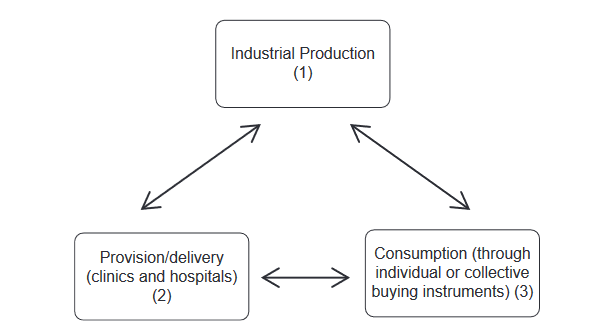
By Smita Srinivas and Pritika Rao
With mixed teams (offering expertise across economics, policy and medicine), real-time professional engagement and a determination to look at industrial feedback, an evolutionary heuristic (Srinivas 2012) (Figure 1) was used to analyse and classify how countries responded to COVID-19 (see Table 1). There have been many surprises, the most significant of which is that unexpected countries (not linked to industrialized status or industrial capabilities) have emerged as innovators through rapid switching and scale-up (Srinivas, Prasad and Rao 2020).
This study also offers valuable lessons for cancer care. It identifies at least seven critical types of systemic uncertainties affecting the decision making and supply chain for COVID-19 testing (Srinivas, Prasad and Rao 2020: 4). These uncertainties merit close attention for the case of cancer care. The study also reinforces the importance of studying cancer's industrial background, and shows how new methodologies including heuristics can offer insight into misclassification of innovative practices in low- and middle-income countries.
Figure 1: The institutional triad

Source: Srinivas (2012), Market Menagerie, p. 8
In the COVID-19- context, the above domains (Figure 1) translate as follows:
|
Domain |
COVID-19 context |
|
Production (1) |
Domestic manufacturing capabilities (especially, but not exclusively, of COVID-testing kits) |
|
Production (1*) |
Successful response to local context with need for some imports |
|
Production (1**) |
Almost completely self-reliant |
|
Delivery (2) |
Essential outreach of clinics and hospitals |
|
Individual or collective consumption (3) |
Covered by out-of-pocket payments, insurance or other system of payment coverage for easier access |
Table 1: COVID-19 industrial response from countries (by region)
|
Country |
Testing strategy |
Triad domains |
|
African countries |
||
|
Morocco |
incremental testing; primarily import driven; limited local manufacturing |
(1,2) |
|
Egypt |
limited testing; primarily import driven; incremental local manufacturing |
(1,2) |
|
Senegal |
high testing; importer; incremental local manufacturing |
(1*,2) |
|
Ghana |
high testing; importer; incremental local manufacturing |
(1,2,3) |
|
Tanzania |
low testing; import driven; limited local manufacturing |
(2) |
|
Kenya |
incremental testing; importer; extensive local manufacturing |
(1*,2,3) |
|
Nigeria |
incremental testing; importer; extensive local manufacturing |
(1*,2,3) |
|
South Africa |
high testing; import driven; limited local manufacturing |
(1,2) |
|
High-income countries |
||
|
USA |
extensive testing; primarily import driven; incremental local manufacturing |
(1,2,3) |
|
UK |
delayed testing; primarily import driven; limited local manufacturing |
(1*,2,3) |
|
Germany |
high testing; exporter; extensive local manufacturing |
(1*,2,3) |
|
Asian countries |
||
|
Israel |
delayed & limited testing; extensive R&D and local manufacturing |
(1**,2,3) |
|
India |
extensive testing; increasing export intensity; rapid shift to local manufacturing |
(1**,2,3) |
|
South Korea |
extensive testing; export intensive; extensive local manufacturing |
(1**,2,3) |
|
Vietnam |
extensive testing; export intensive; extensive local manufacturing |
(1**,2, 3) |
|
China |
extensive testing; export intensive; extensive local manufacturing |
(1**,2,3) |
|
Singapore |
delayed testing; importer; incremental local manufacturing |
(1*,2,3) |
|
Japan |
limited testing; import intensive; limited local manufacturing |
(1,2,3) |
|
Sri Lanka |
high testing; importer; incremental local manufacturing |
(1,2,3) |
|
Bangladesh |
decelerated and limited testing; importer; no local manufacturing |
(1,2,3) |
|
Pakistan |
decelerated testing; importer; limited local manufacturing |
(2,3) |
Source: Srinivas, Prasad & Rao (2020); information in the table has been compiled by the authors from various media and reportage over the lifetime of the pandemic (March 2020 – November 2020).
References:
Srinivas, S. (2012). Market Menagerie: Health and development in late industrial states. Stanford: Stanford University Press.
Srinivas, S., R.K. Prasad and P. Rao (2020) 'The clinical foreground and industrial background: Customizing national strategy for COVID-19 testing'. IKD Working Paper 87, The Open University https://www.open.ac.uk/ikd/publications/working-papers/87